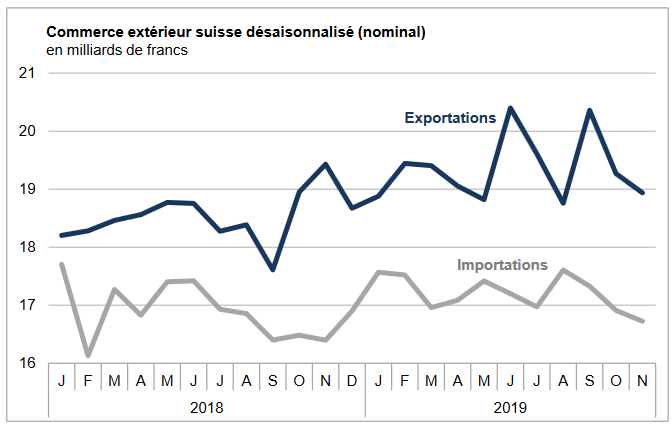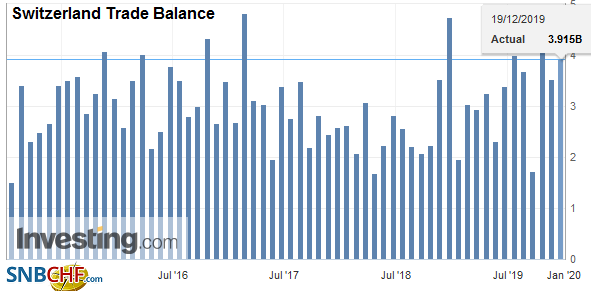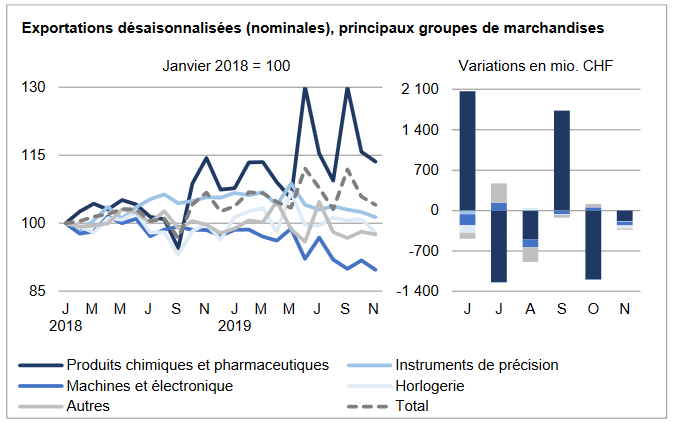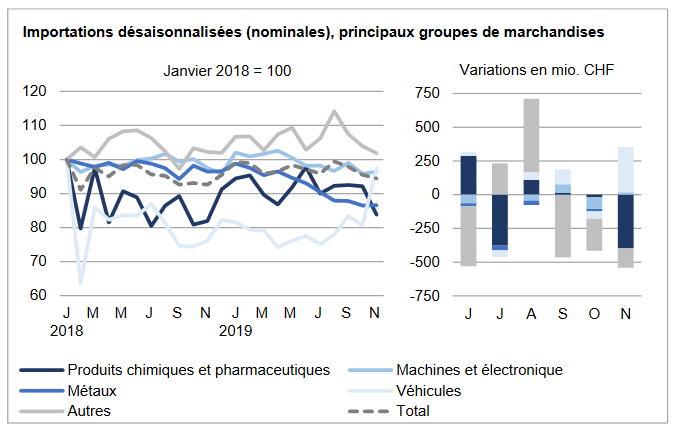We do not like Purchasing Power or Real Effective Exchange Rate (REER) as measurement for currencies. For us, the trade balance decides if a currency is overvalued. Only the trade balance can express productivity gains, while the REER assumes constant productivity in comparison to trade partners. Who has read Michael Pettis, knows that a rising trade surplus may also be caused by a higher savings rate while the trade partners decided to spend more. This is partially true. Recently Europeans started to increase their savings rate, while Americans reduced it. This has led to a rising trade and current surplus for the Europeans. But also to a massive Swiss trade surplus with the United States, that lifted Switzerland on the U.S. currency manipulation watch list. To
Topics:
George Dorgan considers the following as important: 2.) Trade Balance News Service Bunt [FR], 2) Swiss and European Macro, Featured, newsletter, Switzerland Exports, Switzerland Exports by Sector, Switzerland Imports, Switzerland Imports by Sector, Switzerland Trade Balance
This could be interesting, too:
Nachrichten Ticker - www.finanzen.ch writes Die Performance der Kryptowährungen in KW 9: Das hat sich bei Bitcoin, Ether & Co. getan
Nachrichten Ticker - www.finanzen.ch writes Wer verbirgt sich hinter der Ethereum-Technologie?
Martin Hartmann writes Eine Analyse nach den Lehren von Milton Friedman
Marc Chandler writes March 2025 Monthly
We do not like Purchasing Power or Real Effective Exchange Rate (REER) as measurement for currencies. For us, the trade balance decides if a currency is overvalued. Only the trade balance can express productivity gains, while the REER assumes constant productivity in comparison to trade partners.
Who has read Michael Pettis, knows that a rising trade surplus may also be caused by a higher savings rate while the trade partners decided to spend more. This is partially true. Recently Europeans started to increase their savings rate, while Americans reduced it. This has led to a rising trade and current surplus for the Europeans. But also to a massive Swiss trade surplus with the United States, that lifted Switzerland on the U.S. currency manipulation watch list.
To control the trade balance against this “savings effect”, economists may look at imports. When imports are rising at the same pace as GDP or consumption, then there is no such “savings effect”.
After the record trade surpluses, the Swiss economy may have turned around: consumption and imports are finally rising more than in 2015 and early 2016. In March the trade surplus got bigger again, still shy of the records in 2016.
Swiss National Bank wants to keep non-profitable sectors alive
Swiss exports are moving more and more toward higher value sectors: away from watches, jewelry and manufacturing towards chemicals and pharmaceuticals. With currency interventions, the SNB is trying to keep sectors alive, that would not survive without interventions.
At the same time, importers keep the currency gains of imported goods and return little to the consumer. This tendency is accentuated by the SNB, that makes the franc weaker.
Texts and Charts from the Swiss customs data release (translated from French).
Exports and Imports YoY DevelopmentAs in the previous month, cross-border flows of goods fell in both directions of traffic in November 2019. In seasonally adjusted terms, exports fell 1.7% on a month compared to 1.1% for imports. Swiss sales fell back to their level at the start of 2019, while admissions fell by almost a billion francs. The trade balance closed with a surplus of 2.2 billion francs. In short ▼ Chemistry-pharma has regressed in both directions of traffic ▼ Imports from Asia and Europe: negative trend since the start of the year ▲ Increase in trade with North America |
Swiss exports and imports, seasonally adjusted (in bn CHF), November 2019(see more posts on Switzerland Exports, Switzerland Imports, ) Source: newsd.admin.ch - Click to enlarge |
Global evolutionIn November 2019, seasonally adjusted exports contracted 1.7% over a month (actual: -0.8%). Consequently, they fall just below 19 billion francs, their level at the start of the year. Imports fell 1.1% (actual: + 0.5%) to reach their lowest level of the year. The trade balance surplus reached 2.2 billion francs. |
Switzerland Trade Balance, November 2019(see more posts on Switzerland Trade Balance, ) Source: investing.com - Click to enlarge |
ExportsDecline in exports for a wide range of products Exports suffered a large-scale setback in November. The largest drop was in chemicals and pharmaceuticals (-183 million francs; -1.9%). Here, drug sales plunged by 312 million francs over a month. Conversely, the active ingredients increased by 282 million francs. The jewelry segment (-7.2%; other goods group), the machinery and electronics sector (-2.3%) and the watch industry (-2.9%) also recorded red figures. For this trio, the cumulative decrease amounted to 181 million francs. Among the three main markets, only North America increased (+107 million francs; USA: +85 million). Sales to Europe and Asia lost CHF 218 million and CHF 284 million in one month, respectively. On the Old Continent, Germany (-240 million) and the United Kingdom (-85 million) were the most affected while Belgium shone (+185 million). The Asian decline was the result of China’s plunge (-153 million), which had posted a 16.5% surge the previous month. |
Swiss Exports per Sector November 2019 vs. 2018(see more posts on Switzerland Exports, Switzerland Exports by Sector, ) |
ImportsAircraft imports are on the rise In November 2019, the decline in entry came from the contraction of chemical and pharmaceutical products (-399 million francs; active ingredients: -35.7%) as well as energy products (-121 million; other goods group). Conversely, imports from the vehicle sector jumped by a fifth (aeronautics: +424 million). Imports from Europe (-281 million francs) and Asia (- 252 million) suffered a setback; those in North America, on the other hand, swelled by half a billion francs (USA: +558 million francs) over a month. The European result was weighed down by the fall of Ireland (-172 million; pharma). Overall, European imports have been on a negative trend since the start of the year. In Asia, the United Arab Emirates (+149 million; gold jewelry for recasting) stood out, as did the opposite, Singapore (-160 million; pharma) and Japan (-96 million; pharma). Asian deliveries have also been trending down since August 2019. |
Swiss Imports per Sector November 2019 vs. 2018(see more posts on Switzerland Imports, Switzerland Imports by Sector, ) |
Tags: Featured,newsletter,Switzerland Exports,Switzerland Exports by Sector,Switzerland Imports,Switzerland Imports by Sector,Switzerland Trade Balance


